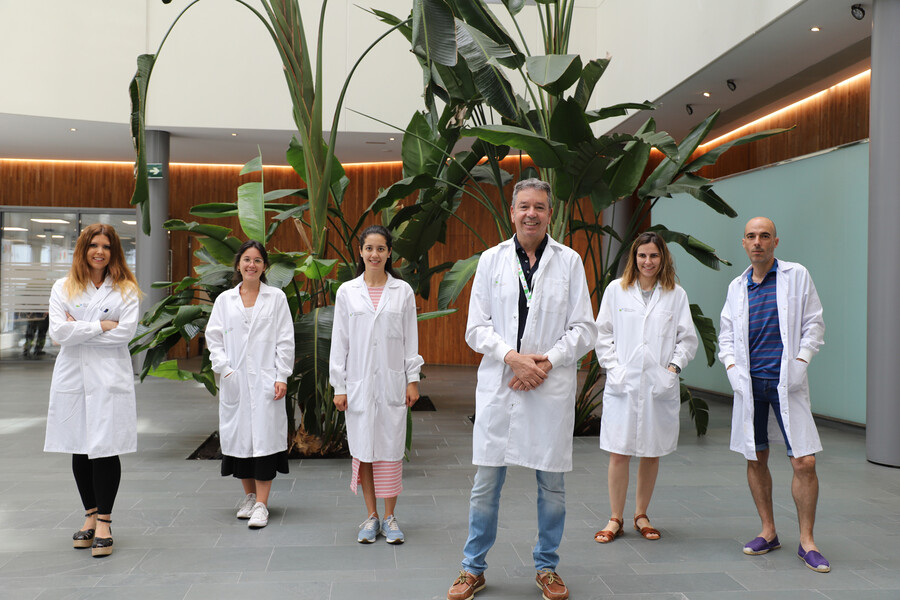
Introduction
Myelodysplastic syndromes (MDS) are a heterogeneous group of haematological stem cell disorders that result in ineffective haematopoiesis, blood cytopenia, myelodysplasia and a significant risk of progression to acute myeloid leukaemia (AML). MDS is one of the most common haematological malignancies in the elderly and the severity of the disease depends on a variety of biological factors that translate into a spectrum of symptoms with a profound impact on the patient’s quality of life and survival; a third of MDS patients will progress to AML and the remaining two thirds will suffer from a combination of chronic anaemia, recurrent infections and bleeding episodes.
Our Research
Our research focuses on unravelling the heterogeneity of myelodysplastic syndromes (MDS), mainly using genomic techniques. We study MDS patients who harbor a specific cytogenetic alteration: the deletion of the long arm of chromosome 5. Our aim is to improve the genetic characterization of these patients by studying the impact of adjunct cytogenetic abnormalities on their prognostic stratification; how cytogenetics and mutations can influence the response to lenalidomide treatment; the molecular landscape of MDS through next-generation sequencing techniques; and, finally, intratumoural heterogeneity before and after lenalidomide treatment using single-cell techniques.
Our Goals
Through our research, we intend to contribute to a better understanding of MDS from a genomic point of view, contributing to refine the current criteria to diagnose this disease and predict patient outcomes to select the best possible treatment. Hence, our research addresses the following lines: 1. Evaluating the feasibility of using peripheral blood samples to perform genetic analyses (SNP-A and NGS) in MDS. 2. Monitoring mutational burden in low-risk MDS patients through the use of sequential peripheral blood samples to minimize invasive techniques on these patients. 3. Genetic characterization of myelodysplastic syndromes / myeloproliferative neoplasms (MDS/MPN) to define the genetic changes that could contribute to the differential diagnosis and prognostic stratification of these patients. 4. Genetic characterization of therapy-related myeloid neoplasms. 5. Mechanisms of progression from clonal haematopoiesis to MDS.
Our Challenges
Our research can translate into a more efficient use of public healthcare resources and improve the quality of life for patients. Therefore, we want to shed light on the following questions: 1. How might genomic techniques contribute to refining the current criteria for MDS diagnosis, prognostic stratification and treatment response? 2. Can peripheral blood samples be useful to monitor MDS patients through next-generation sequencing? 3. Could single-cell studies help us better understand intratumoral heterogeneity and clonal evolution from CHIP to MDS and TRMN (therapy-related myeloid neoplasms)?
Selected Publications
Current Grants
Instituto de salud carlos iii
Caracterización del paisaje germinal y somático de las neoplasias mieloides asociadas a tratamiento (TRMN)

Instituto de salud carlos iii
UMBRELLA-SUMMA Legacy: Unified platforM for a Better integRal Evaluation of myeLodyspLastic syndromes in spAin-Strategy for Unraveling personalized genoMic Medicine in public heAlth system incorporating patient reported outcomes.
Fundación española de hematología y hemoterapia
Prevalencia de la predisposición germinal diferencial en los síndromes mielodisplásicos y neoplasias mieloides relacionadas con la terapia (Trmn)
Agència de gestió d'ajuts universitaris i de recerca
Genetic characterization of myelodysplastic syndromes with germline predisposition (gMDS) and therapy-related myeloid neoplasms (TRMN)




